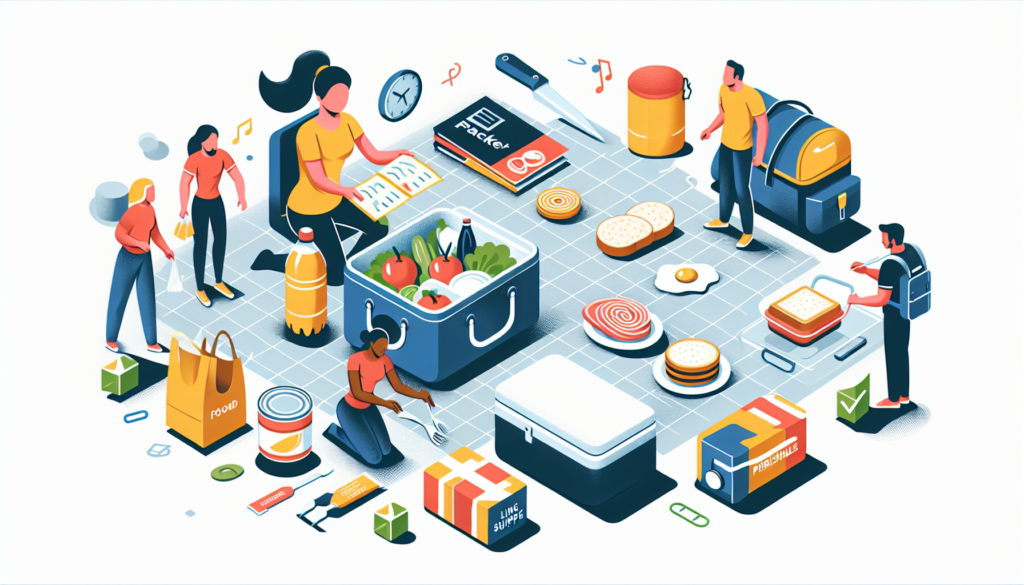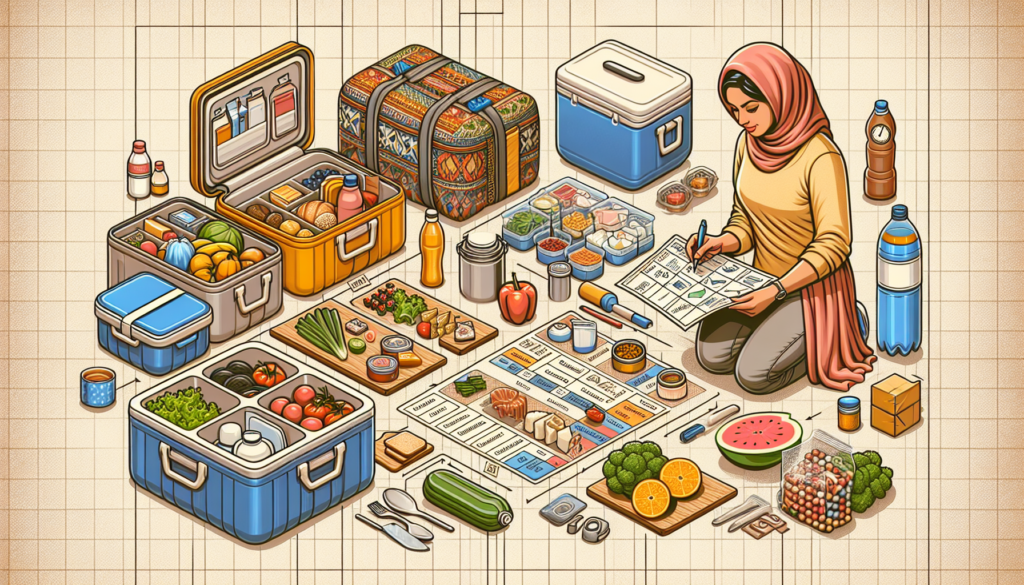Going on long trips can be an exciting adventure, but managing food and supplies can sometimes feel overwhelming. From ensuring you have enough snacks to keep everyone satisfied, to packing essential items, it’s essential to plan ahead. In this article, we will explore some practical tips and tricks to help you effectively manage your food and supplies, ensuring a smooth and enjoyable journey for you and your fellow travelers. So, buckle up and get ready to discover how to conquer the challenges of nourishment and preparation on those long journeys.
Preliminary Planning
Before embarking on a long trip, it’s essential to have a plan in place for managing food and supplies. The first step in this process is to determine the duration of your trip. Knowing how long you’ll be on the road will help you estimate the amount of food and supplies you’ll need to pack.
Once you know the duration of your trip, the next step is to identify your destinations and stops. Researching the places you’ll be visiting will give you a better idea of the availability of food and supplies along your route. This information will be crucial in determining whether you need to pack extra provisions or if you can rely on restocking along the way.
Gathering information about food and supply availability is another important aspect of preliminary planning. Find out if there are any dietary restrictions or preferences that need to be taken into account. If you or any of your travel companions have specific dietary needs, such as vegetarian, vegan, or gluten-free, make sure to research the availability of suitable food options in the places you’ll be visiting.
Meal Planning
Once you have a clear understanding of the duration of your trip and the destinations you’ll be visiting, it’s time to start meal planning. The first step is to calculate the number of meals required. Consider the number of days you’ll be traveling and the frequency at which you’ll be eating. This will help you estimate the quantity of food you need to pack.
When planning your meals, it’s essential to take into account any dietary restrictions and preferences. If someone in your group is lactose intolerant, for example, you’ll need to plan meals that don’t include dairy products. Similarly, if someone prefers vegetarian meals, make sure to incorporate vegetarian options into your meal plan.
Plan for breakfast, lunch, and dinner, but don’t forget about snacks and drinks. Packing easy-to-grab snacks like granola bars, nuts, and dried fruit can come in handy when hunger strikes between meals. Additionally, don’t forget to bring along beverages like water, juice, and possibly even electrolyte drinks to keep everyone hydrated throughout the trip.

Food Storage
Choosing suitable containers for food storage is crucial to keeping your provisions fresh and safe to consume. Opt for containers that are durable, airtight, and leak-proof. Mason jars, reusable silicone bags, and plastic food storage containers are all great options.
Consider the perishability and shelf life of the food you’ll be bringing along. For items that require refrigeration, such as meat and dairy products, it’s essential to use coolers and ice packs to keep them at a safe temperature. If possible, opt for non-perishable food items that don’t require refrigeration to minimize the risk of spoilage.
Minimizing waste and packaging is not only environmentally friendly but also makes your food storage more efficient. Consider removing excess packaging from items before packing them and opt for reusable containers instead of single-use plastic bags.
Shopping and Packing
To ensure you have everything you need for your trip, create a detailed shopping list. Take into account all the meals and snacks you had planned and list out the ingredients and supplies required for each. Having a comprehensive shopping list will help you stay organized and ensure you don’t forget any essential items.
Research local supermarkets and specialty stores along your route. Knowing where you can find groceries and supplies will make restocking easier and more efficient. Additionally, consider the frequency at which you’ll need to shop for fresh ingredients. If you’ll be passing through towns regularly, you can plan for more frequent grocery stops. However, if you’re traveling through more remote areas, you may need to pack additional non-perishable items to last between restocking opportunities.
When packing your food and supplies, it’s a good idea to start with non-perishable items first. Canned goods, dry pasta, and spices are all examples of items that won’t spoil and can be packed in advance. Organize your supplies and ingredients into containers to keep them neat and easily accessible throughout your trip.

Cooking and Meal Preparation
Whether you’ll be cooking over a campfire, using a portable stove, or utilizing cooking facilities at your accommodation, it’s important to pack the necessary cooking tools and utensils. Ensure you have pots, pans, utensils, and basic kitchen equipment such as knives and cutting boards.
Meal prepping before your trip can save you time and effort on the road. Consider preparing meals in advance and portioning them into individual servings. This will make it easier to reheat and enjoy your meals when you’re on the go. Look for recipes that are easy to make and can be prepared in advance, such as casseroles or one-pot dishes.
If you’ll be cooking over a campfire or enjoying barbecues, plan meals that are suitable for these types of cooking methods. Foil packet meals, skewers, and grilled vegetables are all great options for outdoor cooking.
Water and Hydration
Proper hydration is crucial during any trip, especially when you’re on the road for an extended period. Calculate how much water you’ll need and ensure you have enough portable water storage containers to carry an adequate supply. Collapsible water jugs or reusable water bottles are excellent options for storing water.
It’s also a good idea to have a backup plan for water purification. Boiling water is one effective method of purification, so be sure to pack a pot or kettle that can be used for boiling. Alternatively, consider portable water filters or purification tablets as an additional precautionary measure.
In addition to water, make sure to pack electrolyte drinks and rehydration powders. These can be especially useful during strenuous activities or in hot climates when you need to replenish electrolytes lost through sweating.
Managing Fresh Produce
Fresh produce is a great addition to any meal, but it can quickly spoil if not properly managed. Choose produce with longer shelf life, such as apples, oranges, carrots, and potatoes. These items tend to last longer without refrigeration.
Storing fruits and vegetables properly is crucial to prolong their freshness. Avoid storing them directly in plastic bags, as this can trap moisture and speed up spoilage. Instead, opt for breathable storage bags or use containers with ventilation to allow air circulation and prevent rotting.
When it comes to consuming fresh produce, prioritize highly perishable items first. Eating items like berries, salad greens, and ripe avocados early in your trip will help ensure they are enjoyed at their best.
Restocking and Resupply
Even with careful planning, you may find yourself needing to restock your food and supplies on longer trips. Identify restocking locations along your route and make note of potential grocery stores or specialty shops where you can find the items you need.
When planning restocking stops, take the opportunity to explore local cuisine experiences. Trying regional foods and ingredients can add a delicious and exciting element to your trip. You may come across unique spices, sauces, or snacks that you wouldn’t find at home.
Handling Waste and Trash
Responsible waste management is crucial when traveling to minimize your impact on the environment. Dispose of trash responsibly by carrying trash bags or bins with you. Avoid leaving any waste behind, especially in natural areas or campsites.
Practicing leave-no-trace principles is especially important on outdoor trips. Make sure to pack out all your trash, leaving the environment as clean and pristine as you found it. Leave-no-trace principles include properly disposing of food waste, ensuring all trash is secure and won’t attract wildlife, and leaving natural areas undisturbed.
Emergency Preparedness
While we hope for the best on any trip, it’s essential to be prepared for emergencies. Carry essential medical supplies, including a first aid kit, any necessary medications, and basic over-the-counter remedies. It’s better to have these items on hand and not need them than to find yourself in a situation without proper medical supplies.
In case of unexpected circumstances or delays that may affect your food supply, it’s a good idea to have emergency food rations as backups. These can include items like protein bars, canned goods, or dehydrated meals that have a long shelf life and can sustain you until you can restock.
Having a backup cooking method is also wise in case your primary cooking equipment malfunctions or becomes unavailable. Consider packing a camping stove or portable grill as a backup option for preparing meals.
Lastly, make sure to have emergency contact numbers stored in your phone or written down somewhere easily accessible. This includes local emergency services, your insurance provider, and any important contacts who can assist you in case of an emergency.
By following these steps and adequately planning for food and supplies, you can ensure a smooth and enjoyable long trip. With careful consideration of your needs, preferences, and emergency preparedness, you’ll be ready to tackle any adventure that comes your way. Bon appétit and safe travels!

